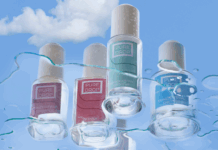On the occasion of its annual general meeting, the FEBEA (Fédération des Entreprises de la beauté) unveiled a macro-economic study carried out by the economic research and consultancy firm Asterès on the cosmetics sector in France: weight of players, territorial presence, investment in innovation, jobs created. At a time when French industry is stagnating and growth remains sluggish, the study presented by Nicolas Bouzou demonstrates that the cosmetics sector is indeed an exceptional one, one of the few where France is world leader. The study is complemented by an analysis from CH2 Conseil, highlighting the global reach of the sector's assets, linked to France's cultural and emotional heritage. Both studies highlight the sector's resilience in the face of emerging consumer trends (local, ecological, home-made, digital) and cosmetics brands from other "cultures", such as those from Asia or Brazil.
Family-owned and regional businesses make up the 3ème exporting sector
The Asterès study was able to reassess the rare and emblematic weight of a truly industrial success story, from upstream to downstream. With a network of family-run companies (82% are single family-owned) based in the regions (67% are regional), the cosmetics industry has succeeded in conquering the world and raising France's profile. With annual exports of €14 billion, cosmetics manufacturing is the 3rd largest contributor to France's trade balance. Highly efficient in R&D, production and distribution, these companies are competitive at every level of the industry, and without the support of public authorities or major export contracts, which, compared to other sectors, is what sets them apart. They are at the heart of France's industrial fabric, with sales of 45 billion euros for the sector as a whole, including 24 billion euros generated by manufacturers, and generate 246,000 jobs, including 164,000 direct jobs in France, 80% of which are located in the regions.
As the most innovative sector, the cosmetics industry also contributes to France's "soft power".
R&D in the cosmetics industry is the most efficient in France, with 3.6 patents filed per million euros spent on R&D. In addition to these investments, French excellence is based on cosmetic know-how and the quality of training, on the long-term vision of family-run businesses, and on the strength of the "France brand". As a result, French companies are world leaders with 23% of market share, and growing steadily: exports increased by 5% per year between 2010 and 2018. The entire industry is competitive, with French companies generating an average of 60% of their sales abroad. Exporting to all markets, cosmetics companies play a key role in the French cosmetics industry. soft power and our country's attractiveness to tourists. The "France" brand, by conveying the image of a high-end, quality industry adapting to new societal expectations, makes it possible to increase the value of a cosmetic product by an average of around 30% compared with an equivalent product from another country.
The cosmetics industry must be supported to maintain its leadership and its contribution to our economy.
As emphasized in the study carried out by CH2 Conseil on the attractiveness of the French cosmetics industry abroad, French cosmetics are strong on quality products, innovation and a powerful imagination. But it must also be able to evolve in the face of the very real challenges posed by companies and brands such as K beauty (South Korea) or J beauty (Japan), growing competition from China and now Italy, where public authorities are investing massively to develop dynamic cosmetics ecosystems. Last but not least, new creative and digital brands (such as the "indies" targeting millenials), and societal trends such as the quest for meaning, a return to the local, and the ecologization of practices, represent new challenges.
As Patrick O'Quin, Chairman of the FEBEA, points out, "France's cosmetics companies have created an exceptional industry. They are now looking for political support on both the domestic and export markets, as well as support on regulatory issues, in order to maintain their position as world leaders. Support for 'made in France' must also apply to the cosmetics industry.








